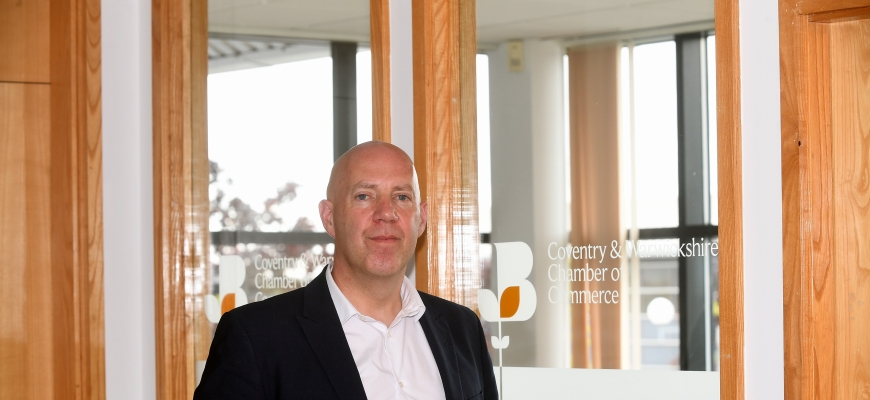
A leading business figure has described Coventry and Warwickshire as a ‘leader in green innovation’ as he welcomed a major national report on how to accelerate the UK’s transition to net zero.
The British Chambers of Commerce (BCC) ‘Green Innovation Challenge’ report has outlined a series of proposals for policymakers, including a new public body to oversee delivery of core climate policies and strengthened resources for the independent Climate Change Committee.
The report also calls for a robust Green Industrial Strategy from Government, a permanent cross-sector approach to green jobs from policymakers and quicker Government action on financing the transition to net zero through the tax system.
The Green Innovation report has been welcomed by the Coventry and Warwickshire Chamber of Commerce after it was published at an event in Glasgow.
It is the first of five policy documents being published by the BCC’s new Business Council as part of the ‘Future of Economy’ project. The report draws on expertise from businesses of all sizes and sectors, academia and think-tanks.
The report acknowledges that the “UK has one of the most substantial legal frameworks for climate change anywhere in the world”. However, it also makes clear that there are “significant challenges ahead” and policy gaps remain.
Establishing a new public body focused on climate delivery, the report says, would ensure genuine cross party working to agree long-term commitments. Strengthened resources for the Climate Change Committee would give it the capacity to provide deeper analysis of specific sectors.
The report highlights the clear call from investors that current green industrial policies need to be brought together into a long-term, cross cutting strategy.
In order to maintain the country’s progress on climate, the report also recommends linking the UK and EU emissions trading schemes, implementing energy grid upgrades and establishing deeper business and Government partnerships.
The report concludes “we are now entering a crunch phase for delivery on net zero” and recognises that “many of the necessary policy measures involve changes to supply chains to customer and business behaviours, and in some cases additional cost burdens at least in the short term”.
Businesses in Coventry and Warwickshire have fed into the report through the Chamber, which held a workshop on net zero at the end of 2023.
Corin Crane, chief executive of Coventry and Warwickshire Chamber of Commerce, said: “Green innovation, net zero and sustainability are key priorities for businesses right across Coventry and Warwickshire. Recently, we hosted a workshop for 50 of our senior members to look at best practice already taking place and to help understand what support businesses need to move towards a net zero agenda.
“Every business in the room was focused on adopting a sustainable approach to doing business. Many already have dedicated staff leading this transformational work, and all were looking at the cost savings by making changes to their buildings, logistics and supply chain.
“There was an acknowledgement that work taking place across our business community means that Coventry and Warwickshire is becoming a UK leader in green innovation, with amazing work being undertaken at both the University of Warwick and Coventry University, the development of the Giga Park and Very Light Rail and the ground-breaking partnership with E.ON in Coventry City Centre.
“However, we know we need to do more to support businesses in this area by developing a clearer understanding of Green Skills, by encouraging more young people to train and take up green jobs, and by showing businesses the route to using green innovation to transform their business model. We very much welcome this report and look forward to helping deliver it with our members.”
Martha Lane Fox, President of the British Chambers of Commerce and Chair of the Business Council, said: “One of the most pressing challenges for all business is the transition to a green and sustainable future. We will have no habitable planet if we don’t encourage rapid and effective actions.
“Our report outlines clear and realistic recommendations to accelerate the UK’s transition to net zero. A robust strategy focused on delivery across the economy must be underpinned by clear and consistent messaging from Government.
“BCC research and engagement with businesses tells us that firms of all sizes want to play their part, but face barriers along the way.
“This report showcases the power of the BCC’s Business Council to assess the key challenges facing the economy head on. The council members are excited about seizing the opportunity to build a sustainable economy that works for all.
“This is just the start of our Business Council work. We look forward to publishing our other key challenge reports in the coming weeks. In the busy political year ahead, our recommendations will provide a crucial blueprint to help build the future of the economy.”
Entrepreneur Lisa Witter, Chair of Green Innovation Challenge Group, said: “The UK has the potential to lead the world in Green Innovation. We believe our report gives policymakers a springboard to unlock that potential.
“All of our recommendations are pragmatic and with political support can be implemented in a timely manner.
“I’ve been delighted to chair our meetings over recent months, bringing together some of the UK’s most prominent businesses alongside leading academics. The message is clear – business can, and will, play a leadership role in sustainably transforming our economy.
“The UK is on the right track. This report’s recommendations can propel British businesses into a global leadership role, seizing the opportunity of becoming the agents of change.”
Emma Howard Boyd, chair of the Green Finance Institute, said: “Extreme weather brought by the climate crisis is increasingly disrupting lives and the economy. The collective ingenuity of British businesses can provide the solutions the world needs.
"The British Chambers of Commerce's report highlights the importance of innovation in a resilient, net zero future. The UK's financial ecosystem should nourish green businesses with capital, and support them with a robust institutional framework underpinned by long-term vision, clear goals, and the agility to adapt."
Ben Goodwin, Director of Policy and Public Affairs at the Institute of Environmental Management and Assessment, said: “The role of businesses in the transition to a greener economy is fundamental, but for this to materialise the appropriate policy and regulatory conditions must be in place. The BCC’s report carefully sets out what is required on this front so that businesses right across the UK can succeed.
“Critically the report also recognises the role of green jobs and skills in driving change and echoes IEMA’s call for a body to be established at the heart of government to advise on green workforce matters over the long-term.”
James Close, Head of Climate Change at NatWest Group, and member of the BCC Business Council, said: “As the first major economy to enshrine net zero into law, the UK has already seen strong progress on our decarbonisation journey.
“However, we know that the next stage will require greater collaboration across the public and private sector to reach net zero by 2050.
“At NatWest, and as highlighted in the Green Innovation Challenge Report, we see that many businesses are determined to play their part in supporting both decarbonisation and green innovation and have the potential to unlock significant revenue for themselves as well as enable the country to meet its climate commitments.”
Yasmin Diamond, Executive Vice President of Global Corporate Affairs at IHG Hotels & Resorts and member of the BCC Business Council, said: “IHG is committed to supporting our owners and hotels with decarbonising their operations and giving them the tools to become more sustainable.
“To achieve this, we’re actively engaging in conversations with governments, the hospitality industry and business communities around the world, advocating for stronger options and innovative technology to make decarbonisation easier and more cost-effective.
“As a group it’s important to have the BCC’s support, helping the industry, advocating for change and together, we can continue to create a more sustainable future for hospitality.”
Ross McKenzie, Corporate Affairs Director at Drax and member of the BCC Business Council, said: “The climate crisis is the critical challenge for the UK and the world. The foundations of this report are built on the expertise of businesses of all sizes and we were delighted to support its development.
“The report sets out practical recommendations which, if adopted, could further catalyse the country’s journey to reaching net zero and accelerating the development of carbon capture and storage.”
Alison McRae, Senior Director at Glasgow Chamber of Commerce and member of the BCC Green Innovation Challenge Group, said: "It is fitting that the Green Innovation report is launched here in Glasgow at the National Manufacturing Institute Scotland ahead of what will be another critical year for our economy and the sustainability agenda.
“Innovation will continue to be at the core of the city region’s ambitions both through the work of our network of Innovation Districts, our UKGOVT Innovation Accelerator Status and of course the ongoing work our businesses - and particularly our SME community - are doing to unlock the innovative solutions we need to see to realise our climate targets.
“As the host of COP26, this city has been championing green innovation and circular economy and we at Glasgow Chamber of Commerce have been at the forefront of fighting for the right economic and policy conditions to empower businesses to accelerate and scale action supporting the move to net zero.
"As we approach the Congress of Business summit to again be held in Glasgow on 14 May, as part of Glasgow Climate Week, this report provides a perfect overview of the challenges and opportunities business face and what support is still needed to achieve our ultimate objectives."
